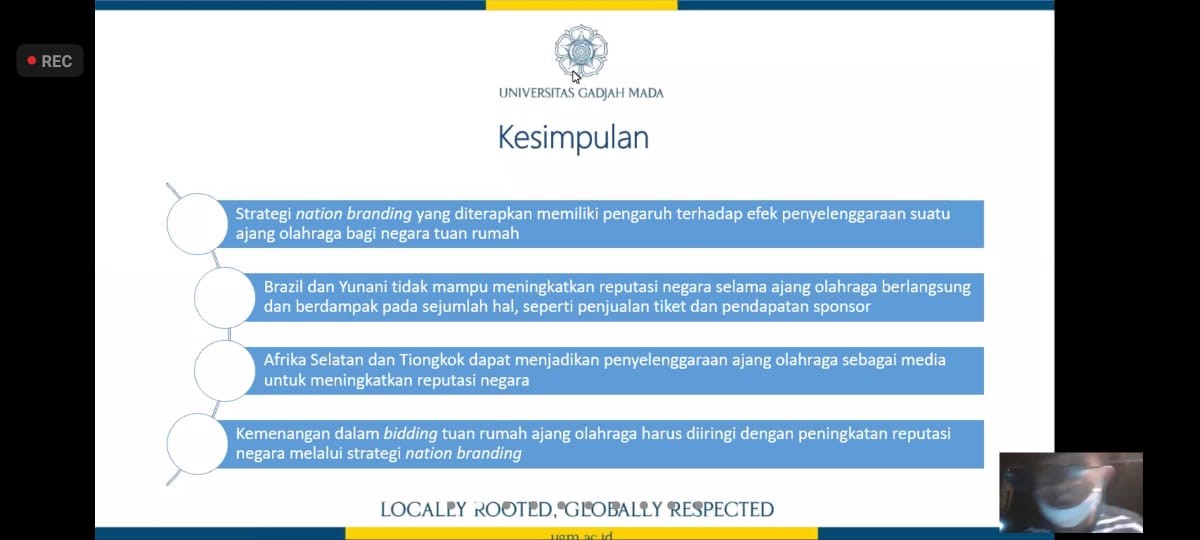
Yogyakarta, October 8th 2020—The International Relations Students Corps (KOMAHI) UGM held Diskors (Diskusi Olahraga Skuy!) on Thursday night (8/10). This sports discussion invited a speaker, an alumna of International Relations of UGM class 2016, Antakarana Tanugraha. In this event, they discussed Tanugraha’s thesis titled as Nation Branding in the Politics of Organizing International Sports Events in Developing Countries. This event started at 06.15 p.m. The background of choosing sports as a discussion material in his thesis was because sport has universal properties that make it attractive to most of the people in the world. The organization of sports events is eagerly awaited by people from all over the world to watch or even visit the venues directly. Becoming a host country for organizing international sporting events is a very dreamy thing because the arrival of tourists to watch matches provides an opportunity and become an economic boost, it makes developing countries compete to host sporting events. This event discussed the comparative study of developing countries that host the Olympics, such as China (2008), South Africa (2010), Greece (2004), and Brazil (2016).
Seeing the situation after the sporting event itself, several developing countries experienced different conditions in terms of the economy after organizing sports events. China experienced an increase in infrastructure (public transportation capacity) and environment (air quality) as well as economic growth in Beijing reached 2.5% .South Africa experienced an increase in the quality of sports infrastructure and continues to be used today. In addition, FIFA and the Ministry of Sports & Recreation of South Africa reported the profits were up to USD 2.5 billion. Meanwhile, Greece then had a large debt for the construction of Olympic facilities, which became a factor in the 2007-2008 economic crisis. Like Brazil, which experienced a budget deficit of around USD 121 million to USD 151 million, and facilities were neglected due to operational debt. Given these differences, the formulation of the problem was why Brazil and Greece experienced economic deficits after hosting a sporting event when China and South Africa can gain a number of benefits through similar efforts.

According to Anta, nation branding in organizing sports events has an impact on economic boost after the Olympics. Through his research, several factors were found that caused Brazil and Greece to suffer losses. In terms of portfolio fulfillment, China opened a special platform for digital live broadcasts as the preparation for the 2008 Olympics so that access to information for sports lovers was even wider. South Africa cooperated with partner companies to launch products related to South African culture. Meanwhile, Brazil carried out an ineffective marketing strategy and the emergence of news from well-known international media which highlighted the ugliness during the preparation for the 2016 Olympics, which generated negative perceptions for the country. Even with Greece, a number of domestic disputes and scandals were exposed by foreign media, such as The Guardian.
In terms of monitoring, China enforced several regulations and maintained the country’s brand by returning to the bidding to host the Asian Games and the Winter Olympics while preparations for the 2008 Olympics were still ongoing. South Africa formed a special institution that was responsible for maintaining the brand or reputation as well as conducting periodic polls to find out people’s perceptions of the country, it was Brand SA. Meanwhile, Brazil and Greece did not have specific institutions that handle nation branding and did not have clear efforts from the government to improve the country’s reputation. Regarding regulations, Brazil did not impose regulations to maintain the country’s reputation, while Greece had tried to enforce regulations but had been hindered by a swelling budget.
Furthermore, the unique identity of a country can also be used for nation branding. Among them was the view of China as an environmentally friendly country with infrastructure development and highly efficient preparation through the Green Olympic campaign. For South Africa, many people see South Africa as a country which was able to show a revival to experiencing very rapid economic development and even being selected to host the World Cup. Meanwhile, the identities of Rio de Janeiro and Brazil were associated with slum areas with a number of environmental problems around the city. And Greece which is associated with certain identities, such as a country with a society that tends to rush into work or a country that is not like the story in ancient times.
“The point is, by increasing the branding of the country itself is very important in organizing sports events because the nation branding makes the countries sure to be successful, and can cover the budget that has been provided through ticket sales and merchandise,” Anta said as the closing of the discussion.
